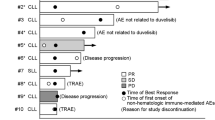Abstract
Duvelisib is a novel dual inhibitor of phosphoinositide-3-kinase (PI3K)-δ and -γ. This single-arm, multicenter phase I study investigated its safety, pharmacokinetics, and preliminary efficacy in Japanese patients with relapsed or refractory lymphoma. Duvelisib was administered orally twice daily at 25 mg in 28-day cycles. Seven patients, comprising 4 with follicular lymphoma (FL), 2 with diffuse large B-cell lymphoma, and 1 with mantle cell lymphoma (MCL) were enrolled. No dose-limiting toxicity occurred in any patient. The most commonly experienced treatment-related adverse events of any grade were neutropenia and thrombocytopenia, occurring in 3 patients each (42.9%); followed by lymphopenia, diarrhea, enterocolitis, stomatitis, hepatic function abnormal, ALT increased, and AST increased, occurring in 2 patients each (28.6%). The most common grade ≥ 3 treatment-related adverse events were neutropenia, which occurred in 3 patients (42.9%), and thrombocytopenia, lymphopenia, and hepatic function abnormal, which occurred in 2 patients each (28.6%). One patient with FL achieved a complete response; the remaining 3 with FL and the 1 with MCL achieved a partial response. The overall response rate was 71.4% (5/7 patients). Duvelisib was well tolerated in Japanese patients with relapsed or refractory lymphoma. Safety and preliminary efficacy data support further development of duvelisib in Japanese patients.
Similar content being viewed by others
References
Clayton E, Bardi G, Bell SE, Chantry D, Downes CP, Gray A, et al. A crucial role for the p110delta subunit of phosphatidylinositol 3-kinase in B cell development and activation. J Exp Med. 2002;196:753–63.
Okkenhaug K, Bilancio A, Farjot G, Priddle H, Sancho S, Peskett E, et al. Impaired B and T cell antigen receptor signaling in p110delta PI 3-kinase mutant mice. Science. 2002;297:1031–4.
Vanhaesebroeck B, Vogt PK, Rommel C. PI3K: from the bench to the clinic and back. Curr Top Microbiol Immunol. 2010;347:1–19.
Fung-Leung WP. Phosphoinositide 3-kinase delta (PI3Kδ) in leukocyte signaling and function. Cell Signal. 2011;23:603–8.
Hanahan D, Weinberg RA. Hallmarks of cancer: the next generation. Cell. 2011;144:646–74.
Gyori D, Chessa T, Hawkins PT, Stephens LR. Class (I) phosphoinositide 3-kinases in the tumor microenvironment. Cancers (Basel). 2017;9:24.
Faia K, Proctor J, Andrade P, et al. High throughput in vitro combination sensitivity screen in hematologic malignancies with the phosphoinositide-3 kinase (PI3K)-delta, gamma inhibitor, duvelisib. J Clin Oncol. 2015;33(15 suppl):8559.
Flinn Ian W, O’Brien Susan, Kahl Brad, et al. Duvelisib, a novel oral dual inhibitor of PI3K-δ, γ, is clinically active in advanced hematologic malignancies. Blood. 2018;131:877–87.
Cheson BD, Pfistner B, Juweid ME, et al. Revised response criteria for malignant lymphoma. J Clin Oncol. 2007;25:579–86.
Flinn Ian W, Miller Carole B, Ardeshna Kirit M, et al. DYNAMO: a phase II study of duvelisib (IPI-145) in patients with refractory indolent non-hodgkin lymphoma. J Clin Oncol. 2019;37:912–22.
Flinn Ian W, Hillmen Peter, Montillo Marco, et al. The phase 3 DUO trial: duvelisib vs ofatumumab in relapsed and refractory CLL/SLL. Blood. 2018;132:2446–55.
Acknowledgements
This work was funded by AbbVie GK, and supported by Verastem Oncology and Infinity Pharmaceuticals. We would like to thank all of the patients, investigators, and support staff who participated in this phase I study. Verastem Inc. provided biostatistical programming support. Yakult Honsha Co., Ltd. and Verastem, Inc. provided medical writing and editorial assistance.
Author information
Authors and Affiliations
Corresponding author
Ethics declarations
Conflict of interest
KI reports grants from Abbvie during the conduct of the study; grants and personal fees from Abbvie, Gilead Sciences, Eisai, MSD, Takeda, Janssen, Mundipharma, Chugai, AstraZeneca, Bayer, Ono, Celgene, and Kyowa Kirin outside the submitted work; and personal fees from Bristol Myers Squib, Dainihon Sumitomo, Nihon Mediphysics; grants from Zenyaku, Solasia, Symbio, Astellas, Astellas Amgen, and Daiichi Sankyo outside the submitted work. KK reports grants from AbbVie during the conduct of the study; grants and personal fees from AbbVie, Celgene, Chugai, Eisai, Janssen, Novartis, Takeda, Kyowa-Kirin, and Ono outside the submitted work; and personal fees from AstraZeneca, MSD, Mundi, and Dainippon-Sumitomo outside the submitted work. HK reports grants and personal fees from Daiichi Sankyo, Astellas, and Novartis Pharma outside the submitted work; grants from Chugai Pharmaceutical, Kyowa Kirin, Zenyaku Kogyo, FUJIFILM, Otsuka Pharmaceutical, Takeda Pharmaceutical, Sumitomo Dainippon Pharma, Sanofi, Celgene, Nippon Shinyaku, Eisai, and Pfizer Japan outside the submitted word; and personal fees from Bristol-Myers Squibb, and Amgen Astellas BioPharma outside the submitted work. GY has nothing to disclose. KS reports grants and personal fees from Eisai, Celgene, Chugai Pharmaceutical, Kyowa Kirin, and Daiichi Sankyo outside the submitted work; personal fees from AstraZeneca, Takeda Pharmaceutical, Janssen Pharmaceutical, Bristol-Myers Squibb, and Nippon Shinyaku outside the submitted work; and grants from Otsuka Pharmaceutical, and MSD outside the submitted work. KA reports grants and personal fees from Eisai, Takeda, Janssen, Bristol-Myers Squib, Chugai, Astellas, Daiichi Sankyo, Kyowa Kirin, and Otsuka Pharmaceutical outside the submitted work; personal fees from Abbvie, Celgene, Astellas Amgen, and Novartis outside the submitted work; and grants from Dainihon Sumitomo, Ono, Asahi Kasei Pharma, Shionogi, Yakult, Taiho, Mochida, Japan Blood Products, Nihon Kayaku, Shin Nippon Biomedical, Fujifilm Toyama Chemical, Nippon Shinyaku, Nihon Pharmaceutical, Sanofi, and Otsuka Pharmaceutical Factory outside the submitted work.
Additional information
Publisher's Note
Springer Nature remains neutral with regard to jurisdictional claims in published maps and institutional affiliations.
About this article
Cite this article
Izutsu, K., Kato, K., Kiyoi, H. et al. Phase I study of duvelisib in Japanese patients with relapsed or refractory lymphoma. Int J Hematol 112, 504–509 (2020). https://doi.org/10.1007/s12185-020-02929-3
Received:
Revised:
Accepted:
Published:
Issue Date:
DOI: https://doi.org/10.1007/s12185-020-02929-3




